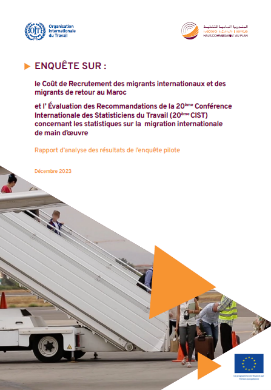Enquête sur le coût de recrutement des travailleurs migrants internationaux et de retour au Maroc
Cette enquête a pour objectif de valider la conception des modules d’enquête nécessaires à la production de statistiques conforment aux recommandations de la 20ème CIST concernant les statistiques sur la migration internationale de main d’oeuvre et aux directives de l’Organisation Internationale du Travail (OIT) et de la Banque Mondiale sur les coûts de recrutement.
-----------------------------------------------------------------------------------------------------------------------
Suite à la signature du protocole d’accord entre l’OIT et le Haut-Commissariat au Plan (HCP) du Maroc , des travaux ont été menés pour établir un système global de statistiques sur les migrations de main-d’oeuvre. Ce système doit assurer le suivi et l’élaboration de politiques fondées sur des données probantes, tel que souligné dans le Pacte mondial sur les migrations et l’Agenda des objectifs de béveloppement durable. Dans ce cadre, un ensemble d’activités d’assistance technique sont mises en œuvre par l’OIT pour accompagner le HCP dans la refonte de l’Enquête nationale sur l’emploi.
Des interventions stratégiques et de nouveaux outils sont en cours de développement pour produire des statistiques visant à documenter et améliorer la gouvernance des migrations de main-d’oeuvre.
L’objectif de ce rapport est d’évaluer la conception des modules pour produire des statistiques sur migration de main-d’œuvre, en tenant en compte principalement (1) des dernières recommandations de la Conférence internationale des statisticiens du travail (CIST) concernant les statistiques du travail et (2) du calcul de l’indicateur de l’Objectif de développement durable (ODD) 10.7.1, qui mesure les coûts de recrutement des travailleurs migrants internationaux et des travailleurs migrants de retour.
Ces données faciliteront l’élaboration de politiques efficaces, qui protègent les droits des travailleurs migrants et assurent une bonne gestion de la migration de main d’œuvre, tout en promouvant le développement durable dans les pays d’origine et de destination.
Type of document :
Country/Region :
Year of publication :
Theme : ,
Gender equality in labour migration law, policy and management (GEM Toolkit)
The Gender equality in labour migration laws, policy and management GEM Toolkits is a set of nine practical tools, developed by the International Labour Organization (ILO) to facilitate the implementation of gender mainstreaming strategies in labour migration and related employment, social protection, and equality laws, policies, programmes, projects, as well as in day-to-day labour migration management practices.
The overall purpose of the GEM Toolkit is to contribute to eliminating discrimination against low-income women migrant workers in employment and occupation, and to shaping more gender-responsive labour migration laws, policy, and management in ASEAN for the benefit of both women and men migrant workers.
Type of document :
Country/Region : , , , , , , , , ,
Year of publication :
Theme : , , ,
2019 Recruitment Costs Pilot Survey Report-Ghana, Measuring SDG Indicator (10.7.1)
This report presents the survey results and examines the recruitment costs, monthly earnings, and Recruitment Cost Indicator (RCI) of migrant workers taking into account their socio-demographic characteristics such as age, occupation, the industry of work, educational attainment, skills, and gender.
In 2019, the Ghana Statistical Service conducted the Recruitment Cost Pilot Survey (RCPS) in four administrative districts, namely, Mampong Municipal, Asante Akim North in the Ashanti Region, and Berekum and Techiman in the Bono and Bono East regions, respectively. The study was mainly designed to pilot an ILO recommended survey methodology to collect data on recruitment costs and monthly earnings of migrant workers from purposely selected districts, in a bid to calculate the SDG indicator 10.7.1 (Recruitment Cost Indicator). This report, therefore, presents the survey results, as it examines the recruitment costs, monthly earnings, and Recruitment Cost Indicator (RCI) of migrant workers taking into account their socio-demographic characteristics such as age, occupation, the industry of work, educational attainment, skills, and sex.
The results of this pilot study show that the survey methodology adopted for this study is suitable for estimating the RCI as required for measuring the SDG indicator 10.7.1. The study shows that the RCI levels, derived from average recruitment costs and monthly earnings for migrant workers, could plausibly be a function of skill level, country of destination, or educational level of the migrant worker. This is because lower levels of RCI could be associated with highly-skilled workers, highly educated migrant workers, and developed countries due largely to commensurate high monthly earnings, a result that resonates with our a-priori expectation.
The Ghana Statistical Service (GSS) implemented the study in collaboration with the International Labour Organization (ILO) with funding from the European Union.
Type of document :
Country/Region : ,
Year of publication :
Theme : , , , ,
Subscribe to the Fair Recruitment Initiative Newsletter
Sign up to receive news delivered to your inbox.



